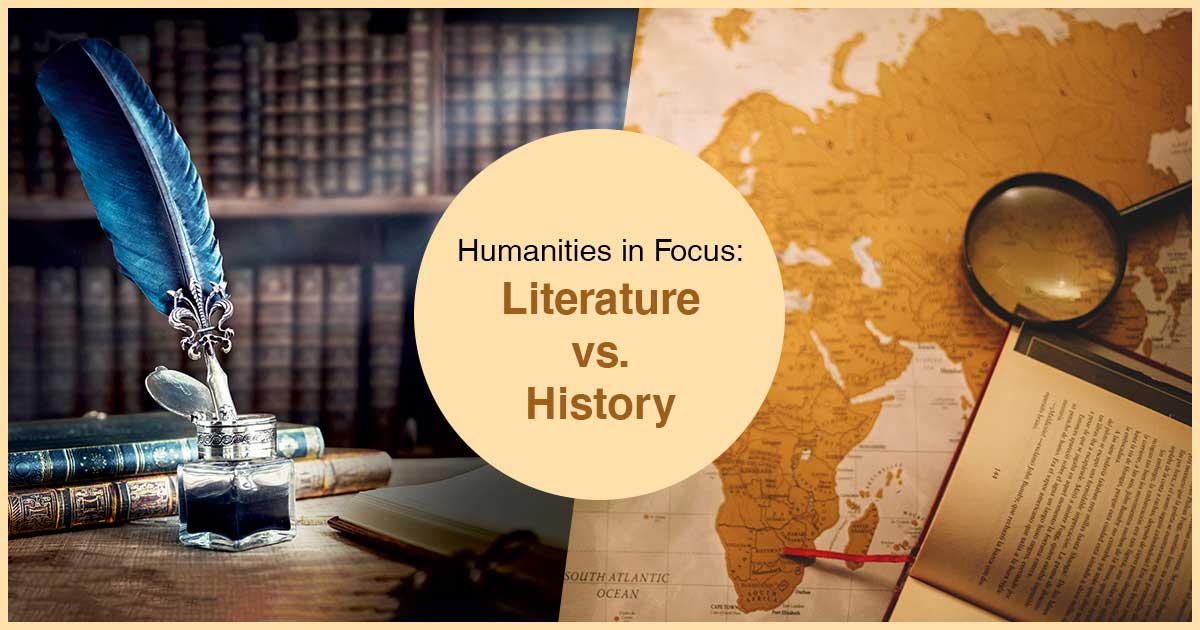Blog Detail


Humanities in Focus: Literature vs. History
22-04-2024

Humanities as an educational stream is crucial for inculcating the skills of critical thinking, cultivating a sense of empathy, understanding the deeper meaning of life and more. The academic field of humanities includes numerous subjects, ranging from literature to psychology, sociology and more. The broad field of humanities intends to study human experience, emotions, political views, cultural significance, value systems and a lot more. In this article, we shall look closer at the two significant subjects in the spectrum of humanities, literature and history respectively.
Literature Vs History: Course Duration and Eligibility
For candidates wishing to pursue literature and history, the courses are available at both undergraduate programme and post-graduate levels. With maximum inclusion of topics and theories from all over the world and with the choices of elective subjects, literature and history are indeed the most popular courses in humanities.
The course duration for each course as per the curriculum design as follows:
- BA. Literature: 3 years
- MA. Literature: 2 years
- BA. History: 3 years
- MA. History: 2 years
Successful course completion of 12th of equivalent studies with a university-accepted aggregate stands as the eligibility criteria for getting enrolled on bachelor programmes for both subjects.
Similarly, successful completion of respective bachelor courses with a university-accepted aggregate stands as the criteria for master’s admission in Literature and History.
Literature Vs History: Course Curriculum
The course curriculum for literature and history has been designed by professionals after multiple revisions to ensure exposure to authentic subject knowledge.
The core areas of study in Literature are, Victorian Literature
American Literature, Readings in Gender and Sexuality, History of English Literature, African-American Literature, Women’s Writings, Creative Writing, English Poetry, Contemporary Fiction, European Literature, Canadian Literature, Renaissance Texts, Research and criticism, Literature, Language and Media
The vast study of history includes History of India (from Ancient up till 600 AD) History of India (600 AD to 1500 AD), History of India (1500 AD to 1800 AD), History of India (1800 AD till Modern Times), Ancient World History, Transformation of Europe, European History, World Politics, History of East Asia, History of the United States of America (USA), History of the USSR, History of Africa, and History of Latin America.
Literature Vs History: Career Opportunities
Career opportunities for students who have completed their undergraduation and postgraduation programmes in literature and History are impressive. Here are some of the career options to consider.
Career options for students after opting for Literature:
- Journalist: Gathers and curates news from all around and present it to the public through broadcast and print media.
- Copywriter: Writes content for ad scripts and other marketing strategies.
- Teacher: Works in schools, colleges and other educational institutes engaging in teaching students and guiding them in research work and projects.
- Marketing executive: Engaged in planning, coordinating and executing marketing activities for better outreach of the company’s service/product.
- Editor: Proofreads and makes necessary changes to already drafted content to make it more polished and prompt for publishing.
- Freelance writer: Writes content of varied types with small and big clients on a project basis.
- Librarian: Manages and curates the books and other reference journals. They also oversee the overall functioning of the library.
- Publisher: Oversees the quality of the content, followed by the distribution, promotion and outreach of the published content (can be a book to a social media blog).
- Author: Engaged in writing novels and stories and publishing them on online and offline media for readers.
- Social media manager: Creates strategies and coordinates publishing content on various social media platforms. They also oversee the metrics, and insights of each social media platform.
- PR manager: Create strategies and execute the same to maintain the desirable image of the client/company.
Career options for students after opting for History:
- Historian: Engaged in studying the historical documents and finding new data giving more details olden civilisations and more.
- Librarian: Manages and curates the books and other reference journals. They also oversee the overall functioning of the library.
- Journalist: Gathers and curates news from all around and present it to the public through broadcast and print media.
- Archaeologist: Engaged in studying past people and culture through excavation of earthen remains.
- Researcher: Engaged in gathering and analysing data to interpret insights that can lead to the discovery of something new.
- Museum Curator: Involved in overseeing the collection of artefacts, preserved materials, excavated elements and more. They are also responsible for the overall functioning of the museum.
- Academician: Teaches students in educational institutions and researching more on the subjects. They are also concerned with giving adequate guidance to students for their project works and research reports.
In Short
After inspecting through a wider lens, it is understood that literature and history are subjects trying to study human evolution, their thought systems and the significant reflection on their way of living. Though these subjects might appear to be intersecting at some point, it is very important to note their differences too so the interchange of subjects might not be everyone’s cup of tea. Candidates must grasp a clearer understanding of the course, structure, and core area of study before applying for either of the courses. Both subjects equally contribute to the shaping of student’s critical thinking, empathy building and other skills. However, understanding one’s area of interest and prioritising the goals are indeed the primary steps to consider during the application process.